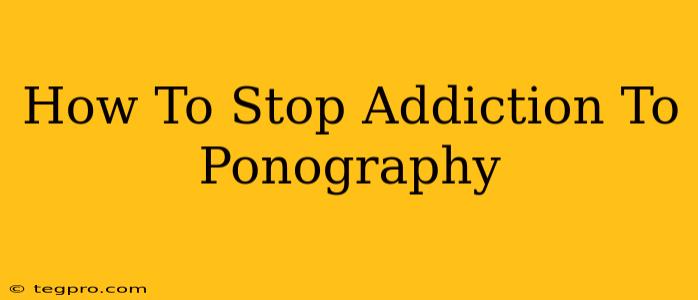Pornography addiction is a serious issue affecting millions, impacting relationships, mental health, and overall well-being. Breaking free requires commitment and a multi-faceted approach. This guide provides actionable steps to help you overcome your pornography addiction and build a healthier life.
Understanding Pornography Addiction
Before diving into solutions, it's crucial to understand the nature of pornography addiction. It's not simply a "bad habit"—it's a compulsive behavior that hijacks the brain's reward system, leading to a cycle of craving, use, and guilt. This cycle can be incredibly difficult to break alone.
Recognizing the Signs
Are you struggling with:
- Loss of control: Finding yourself watching pornography more often or for longer than intended, despite negative consequences?
- Negative consequences: Experiencing relationship problems, job performance issues, or financial difficulties due to pornography use?
- Withdrawal symptoms: Feeling anxious, irritable, or depressed when attempting to abstain from pornography?
- Unsuccessful attempts to quit: Repeatedly trying to stop but failing to maintain abstinence?
- Neglecting responsibilities: Prioritizing pornography use over work, family, or other important commitments?
If you've answered yes to several of these questions, you may be struggling with pornography addiction. Seeking help is a sign of strength, not weakness.
Steps to Overcome Pornography Addiction
Recovery is a journey, not a destination. It requires patience, perseverance, and a willingness to seek support. Here's a structured approach:
1. Acknowledge and Accept the Problem
The first step is acknowledging you have a problem and accepting the need for change. This can be challenging, but it's a critical foundation for recovery. Honesty with yourself is paramount.
2. Seek Professional Help
A therapist specializing in addiction can provide guidance, support, and coping strategies tailored to your specific needs. They can help you understand the underlying causes of your addiction and develop a personalized recovery plan. Consider cognitive behavioral therapy (CBT) or other evidence-based therapies.
3. Build a Support System
Share your struggles with trusted friends, family members, or a support group. Having people you can confide in provides crucial emotional support and accountability during challenging times. Support groups specifically designed for overcoming pornography addiction can offer a sense of community and shared experience.
4. Identify and Address Underlying Issues
Pornography addiction often masks deeper issues like stress, anxiety, depression, or loneliness. Addressing these underlying problems is vital for long-term recovery. Therapy can help uncover and address these root causes.
5. Develop Healthy Coping Mechanisms
Replace unhealthy coping mechanisms with healthier alternatives. This might include exercise, meditation, spending time in nature, pursuing hobbies, or engaging in social activities. Finding healthy ways to manage stress and emotions is crucial.
6. Create a Plan for Relapse Prevention
Relapse is a common part of the recovery process. Having a plan in place for handling potential triggers and setbacks can make a significant difference. This plan might include identifying high-risk situations, developing coping strategies for cravings, and having a support system readily available.
7. Practice Self-Compassion
Be kind to yourself throughout the recovery process. Setbacks are inevitable; don't let them derail your progress. Focus on learning from mistakes and moving forward.
8. Focus on Long-Term Goals
Set realistic, achievable goals for yourself, focusing on building a fulfilling life beyond pornography. This might include strengthening relationships, pursuing personal goals, and cultivating a sense of purpose.
The Road to Recovery is Possible
Overcoming pornography addiction is challenging, but it's definitely achievable. By taking these steps and committing to the process, you can break free from the cycle of addiction and build a healthier, happier life. Remember, you are not alone. Seek help, stay committed, and celebrate your progress along the way.

